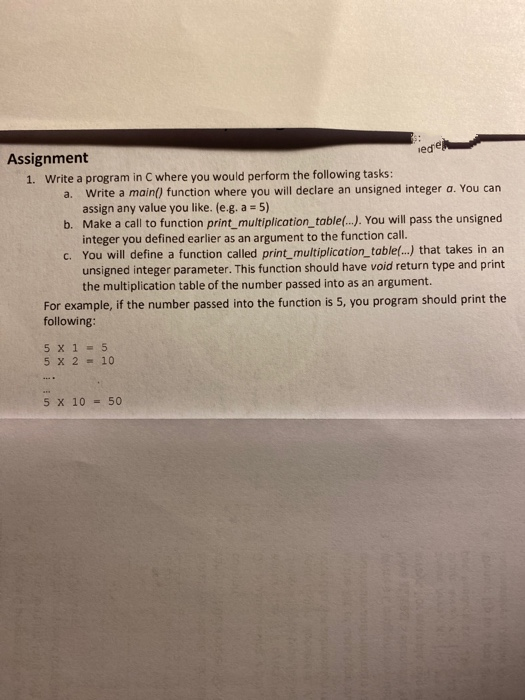Assignment 1. Write a program in C where you would perform the following tasks: Write a main() function where you will declare an unsigned integer a. You can assign any value you like. (e.g. a = 5) b. Make a call to function print_multiplication_table(..). You will pass the unsigned integer you defined earlier as an argument to the function call. C. You will define a function called print_multiplication_table(.-.) that takes in an unsigned integer parameter. This function should have void return type and print the multiplication table of the number passed into as an argument. a. For example, if the number passed into the function is 5, you program should print the following: 5 x 1 = 5 5 x 2 - 10 5 x 10 - 50
Operations
In mathematics and computer science, an operation is an event that is carried out to satisfy a given task. Basic operations of a computer system are input, processing, output, storage, and control.
Basic Operators
An operator is a symbol that indicates an operation to be performed. We are familiar with operators in mathematics; operators used in computer programming are—in many ways—similar to mathematical operators.
Division Operator
We all learnt about division—and the division operator—in school. You probably know of both these symbols as representing division:
Modulus Operator
Modulus can be represented either as (mod or modulo) in computing operation. Modulus comes under arithmetic operations. Any number or variable which produces absolute value is modulus functionality. Magnitude of any function is totally changed by modulo operator as it changes even negative value to positive.
Operators
In the realm of programming, operators refer to the symbols that perform some function. They are tasked with instructing the compiler on the type of action that needs to be performed on the values passed as operands. Operators can be used in mathematical formulas and equations. In programming languages like Python, C, and Java, a variety of operators are defined.
Make a user defined
Sample Output:
Enter a number: 5
5X1=5... And so on

Trending now
This is a popular solution!
Step by step
Solved in 3 steps with 1 images




